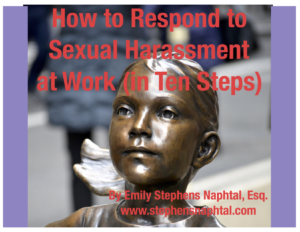Retaliation – Employee’s Basic Rights
Many different laws that protect employees in the workplace include a provision prohibiting retaliation. This means that if an employee believes in good faith that their company is violating the law and they speak up about it, they are protected from the employer’s wrath.
Example Retaliation Provision: Title VII of the Civil Rights Act of 1964
The retaliation provision of Title VII of the civil rights act specifies that:
“It shall be an unlawful employment practice for an employer to discriminate against any of his employees or applicants for employment . . . because he has opposed any practice made an unlawful employment practice by this subchapter, or because he has made a charge, testified, assisted, or participated in any manner in an investigation, proceeding, or hearing under this subchapter.” 42 U.S. Code § 2000e–3(a).
To determine whether unlawful retaliation has occurred, courts break the above definition down into the following steps:
(1) Protected Activity
To trigger retaliation protection, an employee must engage in a protected activity. A protected activity can be either opposition to any practice made unlawful by Title VII of the Civil Rights Act more generally. Or, alternatively, a protected activity can be participation in an investigation, or proceeding related to the the company’s compliance with Title VII of the Civil Rights Act.
Opposition
An employee’s clearest form of opposition would be complaining in writing to the company’s human resources department about an alleged illegal act. The complaint need not be in writing, though it will be easier to prove retaliation if it is. Furthermore, the complaint need not be made to the human resources department or through a company’s prescribed channels. If the employee complains to their boss or another person in a management role at the company, that is enough. Finally, an employee need not name the law they think the company has broken. Simply complaining of the underlying facts that could constitute a legal claim is enough to have engaged in protected activity.
Some jurisdictions have held that refusing a supervisor’s sexual advances is enough to constitute a protected activity for retaliation provision purposes. Others have held that when an employee requests an accommodation — whether to deal with pregnancy, comply with their religious beliefs, or modify their work environment to accommodate their disability — this constitutes protected activity.
Participation
Participating in an investigation or lawsuit is another form of protected activity. In Crawford v. Metro. Gov’t of Nashville & Davidson County, Tenn., 129 S. Ct. 846 (2009), the Supreme Court held that an employee who participated in an employer’s internal investigation of a sexual harassment complaint was protected from retaliation. In the case, the employee answered her employer’s questions with identification of several alleged instances of sexual harassment she had witnessed. Her employer could not legally punish her for speaking truthfully in the investigation even though she did not say what the employer hoped she would.
(2) Employer Knowledge of Protected Activity
Besides engaging in protected activity an employee must be able to prove that their employer had knowledge of the protected activity to make out a retaliation claim. Knowledge is imputed to a company when someone in a management role has knowledge. An employee will have the easiest time proving employer knowledge of their protected activity if they complain in writing to a manager or the human resources department and retain a copy of the written complaint. The employee need not put their complaint in writing to prove employer knowledge, but it is helpful for proving this part of the claim.
(3) Adverse Action
Next, an employee must show that they suffered an adverse action after they engaged in protected activity. An adverse action must be an employer action that “might well deter a reasonable employee from complaining about discrimination.” Burlington N. & Santa Fe Ry. Co. v. White, 548 U.S. 53, 69 (2006). Some examples of actions that could dissuade employees from complaining include: termination, demotion, placement on leave, a negative performance review that affects an employee’s standing in the company or pay, retaliatory harassment, or exclusion from training.
(4) Causal Connection between Protected Activity and Adverse Action
Finally, to prove a retaliation claim, an employee must show that their protected activity caused their employer’s adverse action. In some cases, an employer will inadvertently admit that they took adverse action against an employee because of protected activity. However in many other cases, direct evidence does not exist. In those cases, courts consider various factors such as the timing of the protected activity and the believability of the legal reasons the employer offers to explain why they terminated or otherwise took adverse action against the employee.
Laws That Have Retaliation Provisions
Many employment laws prohibit retaliation. These laws encourage employees to speak up when they believe their employer breaks the law. Here are some examples of laws with such provisions:
- Title VII of the Civil Rights Act (federal discrimination law).
- Age Discrimination in Employment Act (federal discrimination law).
- Americans with Disabilities Act (federal discrimination law).
- Genetic Information Nondiscrimination Act (federal discrimination law).
- New York State Human Rights Law (state discrimination law).
- New York City Human Rights Law (local discrimination law).
- New Jersey Law Against Discrimination (state discrimination law).
- Fair Labor Standards Act (federal law mandating minimum wage and overtime payment).
- New Jersey Labor Law (state wage and hour law).
- New York Labor Law (state wage and hour law).
- Equal Pay Act (federal law mandating equal pay between the sexes).
- New Jersey Equal Pay Act (state law mandating equal pay between the sexes).
- Title IX (not an employment law but can be used by employees of educational institutions to defend their rights).
- National Labor Relations Act “NLRA” (federal law that protects the rights of employees to form, join, or assist a labor organization, as well as join together with other workers to improve the terms and conditions of their employment without a union).
- Occupational Safety and Health Administration “OSHA” (federal law that ensures workplace safety and health standards and regulations).
Overall
Retaliation claims are some of the most successful employment law claims because they are often easier to prove. For example, an employee may have difficulty proving that the bad treatment they experienced in the workplace is a result of race discrimination. However, if they in good faith believe that their employer is discriminating against them, they can complain about it. If the employee made their complaint in writing and retained a copy of it, they will easily be able to prove that they engaged in a protected activity and that the employer knew of the protected activity. If, after they complain, their employer terminates them or takes other adverse actions against them, then they may have a successful retaliation claim.
Besides being slightly more straight forward to prove, retaliation claims are also available to a broader number of actors involved in a workplace conflict. Bystanders can be protected from retaliation. If they see what they believe is illegal activity, they can report it even if it does not involve them personally and receive legal protection.
Contact an employment lawyer if you are considering making a complaint to your employer, or have questions about whether you suffered from illegal retaliation.





